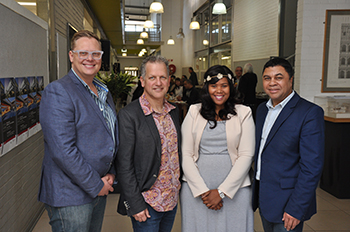Award-winning architect firm presents the 29th Sophia Gray Memorial Lecture and Exhibition

At the Sophia Gray Bursary Fund breakfast, were from the left:
Henry Pretorius, head of the UFS Department of Architecture,
AJ Corbett, and Boipelo Morule, third-year student
in Architecture and Prof Francis Petersen, UFS Rector
and Vice-Chancellor, at the UFS
Photo: Stephen Collett
The laureates of this year’s Sophia Gray Memorial Lecture were George Elphick and Nicholas Proome from the award-winning architecture firm, Elphick Proome Architects (EPA). Over the past 28 years this Durban firm has received 26 awards and its work has been published in 26 magazines.
From bedroom to boardroom
EPA is involved in major corporate architecture as well as several residential projects. It believes that good design is produced from careful study and research combined with sound technical knowledge and artistic judgement. At the 29th Sophia Gray lecture, presented by the Department of Architecture at the University of the Free State, EPA addressed the Bloemfontein community, stating that architecture was about people, space and light.
For EPA, architecture is the form of art with the most impact on society. “Ultimately, our architecture needs to be enjoyed and be hard to forget,” it said.
In its three decades of practice, most of EPA’s built work has been executed in South Africa. It has also completed projects beyond South African borders, including Mozambique, Kenya, Ghana, and France.
The lecture was followed by the opening of the 29th Sophia Gray Memorial Exhibition at Oliewenhuis Art Museum.
New PhD in Architecture with Design announced
A highlight at this year’s lecture was the announcement by Henry Pretorius, the head of the department, of a new and innovative doctoral programme, the PhD in Architecture with Design. From 2018, students with a MArch (professional) or MArch can enrol for this postgraduate qualification.
“The programme recognises the intelligence and ingenuity of design. Its primary objective is to harvest and study the implicit orientations, operations, and achievements of design, and to enlist creativity in the formation of new knowledge. The degree facilitates analytical reflection, stimulates creative action, and opens new insights into the unique logic of design,” said Pretorius.
“Although design-based research has gained international momentum in recent years, similar research has not been done in South Africa until now.”
Contribution to the Sophia Gray Bursary Fund
During a breakfast function, the department also announced another initiative, the Sophia Gray Bursary Fund. Prof Francis Petersen, Rector and Vice-Chancellor at the UFS, said that the type of architecture in developing countries was different from places such as New York and other big cities in developed countries. For a transformed profession we need architects from different cultures and demographics in the system. The bursary fund was a fantastic starting point for this to happen.
The Sophia Gray Bursary Fund initiative is part of a greater call to alumni and friends of the department to be actively involved in the department’s continuous development and future endeavours towards imagination, care, and excellence.
AJ Corbett, founder and director of TCN Architects in East London, made the first contribution towards the fund.